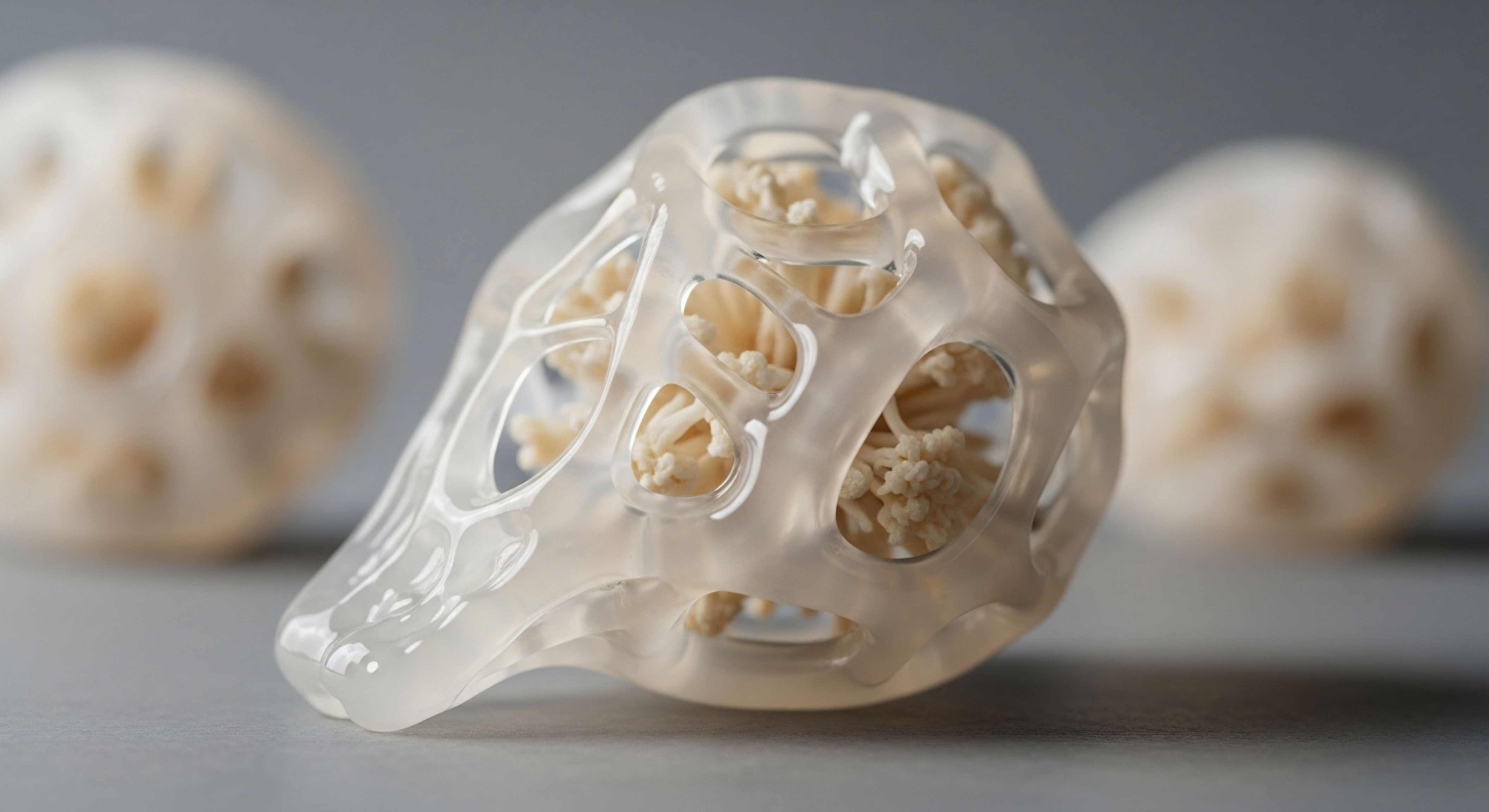

The Unraveling of Biological Prime
The human biological system operates with a sophisticated interplay of hormones, metabolic processes, and cellular signaling pathways. As chronological time advances, these intricate systems undergo predictable, progressive shifts. These shifts are not arbitrary occurrences but fundamental biological processes that influence every facet of our vitality, performance, and resilience. Understanding these changes is the foundational step in proactively managing our biological trajectory.

Hormonal Foundations Erode
The endocrine system, a network of glands producing vital chemical messengers, orchestrates numerous bodily functions. With age, the production and modulation of many key hormones naturally decline. This decline impacts sex hormones like testosterone and estrogen, crucial for muscle mass, bone density, libido, and mood.
Growth hormone (GH) and its mediator Insulin-Like Growth Factor-1 (IGF-1) also diminish, affecting tissue repair, metabolism, and body composition. Melatonin, regulating sleep, and DHEA, a precursor hormone, also decrease, contributing to diminished sleep quality and broader endocrine imbalances. These hormonal shifts are not merely side effects of aging; they are active contributors to the aging process itself, directly influencing cellular function and systemic health.
Age-related decline in hormone production and action detrimentally impacts human health, increasing the risk for chronic disease and reducing life span.

Metabolic Machinery Slows
Concurrent with hormonal shifts, the body’s metabolic engine undergoes significant alteration. Resting metabolic rate can decrease, making the management of energy balance more challenging. Insulin sensitivity often diminishes, a critical precursor to metabolic syndrome and type 2 diabetes.
Body composition changes become more pronounced, characterized by a loss of lean muscle mass and an increase in visceral and subcutaneous fat, particularly around the midsection. These metabolic dysregulations create a less efficient internal environment, impacting energy availability, inflammatory status, and overall physiological function.

Cellular Signaling Fades
Peptides, small chains of amino acids acting as precise cellular messengers, are fundamental to bodily communication, regulating everything from hormone release and immune response to tissue repair and brain activity. As we age, the body’s natural production of these vital signaling molecules declines.
This reduction impairs the efficiency of cellular communication, slowing down the body’s ability to repair damage, regenerate tissues, and maintain optimal function. The diminished signaling capacity affects skin elasticity, recovery times, cognitive clarity, and immune resilience, marking a visible and functional shift towards senescence.

The Compounding Effect
The interplay between hormonal decline, metabolic inefficiency, and reduced cellular signaling creates a compounding effect that accelerates the aging process and diminishes vitality. These interconnected changes create a less robust biological system, more susceptible to chronic disease and less capable of optimal performance and recovery. This cascade affects not just physical capabilities but also cognitive function, mood regulation, and overall quality of life, underscoring the imperative for a proactive, systems-level approach to biological maintenance.


The Blueprint for Cellular Recalibration
Future proofing biology is an active pursuit, a deliberate engineering of one’s physiological architecture for sustained peak performance and longevity. This recalibration involves a multi-pronged strategy, precisely targeting the endocrine system, leveraging the power of peptides, and mastering metabolic health through vigilant biomarker tracking and foundational lifestyle interventions. This is the domain of the Vitality Architect, where science meets aspiration to forge a more resilient and vibrant future self.

Endocrine System Recalibration
Restoring hormonal balance is a cornerstone of biological optimization. This involves understanding individual hormonal profiles and implementing targeted strategies. Hormone Replacement Therapy (HRT), utilizing bio-identical hormones, offers a scientifically validated pathway to replenish declining levels of key hormones like testosterone, estrogen, progesterone, and growth hormone.
Such interventions are not about artificial enhancement but about restoring physiological levels that support optimal function, mitigate age-related disease risk, and enhance overall vitality. Careful medical supervision ensures these therapies are personalized and safe, addressing deficiencies identified through comprehensive diagnostics.

Hormonal Pillars of Vitality
Optimizing sex hormones, such as testosterone in men and estrogen/progesterone in women, directly impacts muscle mass, bone health, cognitive function, and mood. Replenishing Growth Hormone (GH) and IGF-1 supports tissue repair, metabolic efficiency, and body composition. Thyroid hormones are critical regulators of metabolism and energy expenditure; ensuring their optimal function is paramount.
Dehydroepiandrosterone (DHEA), a precursor hormone, plays a role in immune function and stress response. Strategic HRT aims to re-establish optimal levels across these critical hormonal axes, fostering a more youthful and robust physiological state.

Peptide Signaling Mastery
Peptides represent a cutting-edge frontier in biological optimization, acting as precise messengers that instruct cells to perform specific functions. Their small molecular structure allows for efficient absorption and targeted action. By reintroducing specific peptides, we can enhance the body’s natural regenerative and repair processes, counteracting age-related decline.

Key Peptide Applications
- Tissue Repair and Regeneration: Peptides like BPC-157 and TB-500 are renowned for their remarkable ability to accelerate healing in muscles, tendons, ligaments, and gut tissues, while also promoting new blood vessel formation and safeguarding against damage.
- Cellular Rejuvenation: Peptides such as GHK-Cu (Copper Peptide) stimulate collagen and elastin production, leading to firmer, more youthful skin, reduced wrinkles, and improved elasticity. They also possess anti-inflammatory and antioxidant properties.
- Metabolic and Growth Hormone Support: Peptides like Tesamorelin, CJC-1295, and Ipamorelin are potent stimulators of natural growth hormone release. This action aids in reducing visceral fat, building lean muscle mass, and enhancing overall metabolic health and cognitive function.
- Sleep and Cognitive Enhancement: Delta Sleep-Inducing Peptide (DSIP) can help regulate circadian rhythms, promoting deeper, more restorative sleep, which is foundational for recovery and cognitive performance.
- Immune System Fortification: Thymosin Alpha-1 is recognized for its capacity to enhance immune system surveillance and response, bolstering resilience against pathogens and supporting overall health.
These peptides offer targeted interventions that can profoundly influence cellular communication, repair mechanisms, and systemic balance, acting as powerful allies in the quest for extended vitality.

Metabolic Biomarker Vigilance
The concept of biological age, distinct from chronological age, is illuminated through a suite of measurable biomarkers. Tracking these indicators provides a granular view of an individual’s physiological state and trajectory, enabling precise, data-driven interventions. This vigilant monitoring transforms health management from a reactive stance to a proactive, predictive strategy.

Essential Longevity Biomarkers
- Telomere Length: These protective caps on chromosomes shorten with each cell division, serving as a marker of cellular aging. Lifestyle interventions can influence telomere dynamics.
- Inflammatory Markers: Elevated levels of C-reactive protein (CRP) and interleukin-6 (IL-6) signal chronic inflammation, a key driver of age-related diseases.
- Insulin Resistance Indicators: Fasting glucose, HbA1c, and insulin levels reveal how efficiently the body processes glucose. Impaired insulin sensitivity is a critical precursor to metabolic dysfunction.
- Lipid Profile: Cholesterol and triglyceride levels are essential indicators of cardiovascular health and metabolic status.
- Body Composition: Tracking lean muscle mass versus fat mass provides insights into metabolic health and functional capacity.
- Epigenetic Clocks: These advanced biomarkers, like DNA methylation clocks, estimate biological age by analyzing modifications to DNA influenced by lifestyle and environment.
- Hormone Levels: Comprehensive panels assessing key hormones (testosterone, estrogen, GH, IGF-1, thyroid hormones) are critical for understanding endocrine status.
By regularly assessing these biomarkers, individuals gain a clear understanding of their biological status, allowing for tailored adjustments to diet, exercise, sleep, and targeted therapies. This data-informed approach ensures that optimization efforts are effective and aligned with personal biological needs.

Lifestyle as the Cornerstone
While advanced therapies offer potent tools, the bedrock of future-proof biology remains consistent, high-impact lifestyle practices. These are not mere adjuncts but foundational pillars that profoundly influence hormonal balance, metabolic health, and cellular resilience.

The Pillars of Optimal Living
- Strategic Exercise: A regimen combining resistance training for muscle and bone health, cardiovascular work for metabolic efficiency, and mobility practices for functional longevity is essential. Exercise directly influences hormone levels, insulin sensitivity, and inflammatory markers.
- Nutrient-Dense Nutrition: An anti-inflammatory diet rich in antioxidants, healthy fats, and high-quality proteins, while managing glycemic load, supports cellular repair, optimizes metabolic function, and reduces oxidative stress.
- Restorative Sleep: Quality sleep is critical for hormonal regulation, cellular repair, and cognitive function. Establishing consistent sleep hygiene protocols is non-negotiable.
- Stress Management: Chronic stress elevates cortisol, disrupting hormonal balance and accelerating aging. Implementing stress-reduction techniques, such as mindfulness or specific breathing exercises, is vital.
These lifestyle elements work synergistically with advanced therapies, amplifying their benefits and creating a robust foundation for sustained vitality and performance.


The Timing of Biological Mastery
The pursuit of future-proof biology is an ongoing commitment, not a singular event. The question of “when” is less about a specific age and more about adopting a proactive, strategic mindset. Biological mastery is cultivated through consistent engagement, personalized timing, and a dedication to continuous optimization.

Proactive Engagement
The most significant gains in future-proofing biology are realized through early and consistent engagement. Waiting for symptoms of decline to manifest is a reactive approach that can necessitate more intensive interventions. Initiating foundational lifestyle practices and baseline biomarker monitoring in younger adulthood ∞ even in the 20s and 30s ∞ establishes a robust physiological baseline.
This proactive stance allows for the gradual, precise calibration of hormonal systems and metabolic pathways, setting the stage for a more resilient and vital middle and later life.

Personalized Timelines
Biological aging is not uniform; it is deeply individual. While general trends exist, personal genetics, lifestyle history, and environmental factors create unique timelines for hormonal shifts and metabolic changes. Therefore, the “when” for specific interventions is dictated by personalized biomarker data and clinical assessment.
Hormone optimization, peptide therapy, or advanced metabolic tracking are most effective when initiated based on an individual’s specific needs and physiological status, rather than a generalized age-based protocol. This individualized timing ensures interventions are both necessary and maximally beneficial.

Continuous Optimization
The journey of biological mastery is one of continuous refinement. As life circumstances evolve, and as new scientific insights emerge, optimization strategies must adapt. Regular biomarker reassessment, typically every 6-12 months, allows for the fine-tuning of HRT, peptide protocols, and lifestyle adjustments. This dynamic approach ensures that interventions remain aligned with the body’s changing needs, preventing stagnation and maintaining peak performance and vitality throughout life. The commitment is to ongoing adaptation and enhancement, rather than a static endpoint.

The Vigilant Practitioner
Navigating the complexities of biological optimization requires expert guidance. Partnering with physicians and practitioners well-versed in endocrinology, peptide science, and longevity medicine is crucial. These professionals provide the diagnostic tools, interpret complex biomarker data, and design personalized, evidence-based protocols. Their role is to empower individuals with the knowledge and tools to make informed decisions, ensuring that interventions are safe, effective, and strategically timed for maximum long-term benefit.

The Vitality Architect’s Mandate
Mastering your biology is the ultimate act of self-authorship. It is the conscious design of your physiological future, transcending the limitations of passive aging. By understanding the fundamental shifts that occur with time and applying precise, science-backed strategies ∞ from hormonal recalibration and peptide signaling to metabolic vigilance and foundational lifestyle practices ∞ you architect a life of sustained vitality, peak performance, and profound well-being. This is not about merely extending years; it is about amplifying the quality and power within those years.

Glossary

endocrine system

muscle mass

body composition

growth hormone

lean muscle mass

tissue repair

cognitive function

biomarker tracking

metabolic health

bio-identical hormones

hormone optimization

peptide therapy




